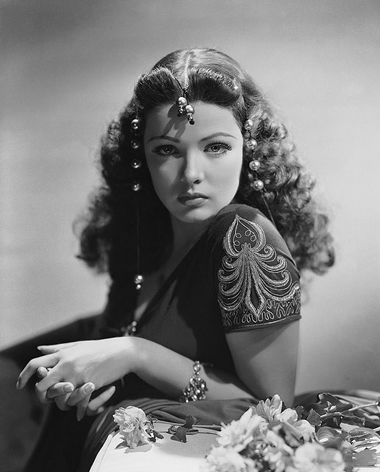
 |
|
|
|
Independent producer Walter Wanger was no stranger to topical and even radical filmic subject matter, having produced the reactionary Gabriel over the White House, the politically ambiguous Invasion of the Body Snatchers and the leftist Spanish Civil War film Blockade. He made at least two more anti-Fascist films before America's entry into the war, Alfred Hitchcock's celebrated Foreign Correspondent and a less well-known adventure thriller, 1941's Sundown. In what might seem an update of Alexander Korda's The Four Feathers, a tiny British outpost in East Africa is targeted by Nazi infiltrators arming African tribes in a bid to conquer the continent. The movie has an interesting cast. The just-married Gene Tierney provides glamour for the marquee, while leading man Bruce Cabot is excellent as the remote post's humane district commissioner. Barré Lyndon's story and screenplay cast Tierney as a mysterious Arab trader, but beyond that highly unlikely notion Sundown proves to be much more intelligent than we expect it to be. When Nazi influence is detected in the area, a lively crew assembles at the Manieka outpost. Newly arrived Major Coombes (George Sanders) at first considers commissioner Crawford (Cabot) negligent on camp security: visitors like white hunter Alan Dewey (Harry Carey) can wander in and out at will. Pallini, a congenial Italian prisoner (Joseph Calleia) serves as the post cook. The bored Lt. Turner (Reginald Gardiner) undercuts Crawford's authority. Coombes accepts Dutch mining engineer Jan Kuypens (Carl Esmond) as a fellow refugee from the encroaching Germans. 
That's when Zia (Gene Tierney) arrives. She's the wealthy daughter of a now-dead Arab trader, and she flies up and down the territory to keep her caravans moving to various towns and tribes. All the men are impressed by Zia's beauty and poise, but Coombes wonders if her retail enterprise might be just a cover -- somebody has to be transporting all those guns that are destabilizing the British territory. What at first resembles a plotline for a Tarzan movie becomes quite suspenseful. Coombes and Crawford engage in a couple of skirmishes with a newly-armed tribe, while skullduggery back at Manieka centers on a native prediction that one of the white men will soon be dead. When Zia disappears immediately thereafter, it is presumed that she is the Nazi double agent. Crawford and Dewey hurry to track down Zia's caravan, which leads to an exciting showdown in the smugglers' underground lair. Sundown avoids the cookie-cutter sameness of major studio productions, taking its cast and crew to New Mexico to find an interesting rocky backdrop for the adventure. Art department sleight of hand augments Hollywood's Bronson Caverns with matte paintings to produce some impressive visuals. Producer Wanger hoped to recover his losses from his expensive Hitchcock production, but this elaborate follow-up doesn't look cheap either. The film provides respectable bit parts for Dorothy Dandridge, Darby Jones and an unmistakable Woody Strode. The biggest part for a black actor goes to Emmett Smith, who had been seen recently in the Greer Garson film Blossoms in the Dust. Familiar Hollywood villains Tetsu Komai and Marc Lawrence play treacherous Arabs from the Nazi tribe. Director Hathaway is as sensitive toward his black cast members as he is with his Anglo stars, an unusual state of affairs for a pre-war American film. Sundown touches on romantic fantasy when we enter Zia's luxurious Arabian boudoir; with no plumbing in sight she always looks as fresh as an African orchid. But the film is primarily an adventure thriller with an active anti-Fascist agenda, at a time when the U.S. Congress was still pressuring Hollywood not to choose sides in the European struggle. (spoiler) The movie's curious ending points strongly to interference from the Motion Picture Production Code. In what seems a last-minute screenplay addition to appease the religious faction in the Code office, a dying cast member suddenly blurts out a speech about "the church" as the real power behind the glorious British Empire. The finale then rushes to England and Cedric Hardwicke's delivery of a war-themed eulogy. The dramatic setting of a bombed-out church was used to better effect in the next year's Mrs. Miniver. We also discover (and this is the major spoiler) that Zia isn't really an Arab after all, but the orphaned daughter of English philanthropists who was only raised by the kindly Arab trader. Zia exchanges her veil for sensible English fashions and weds Crawford; her Muslim upbringing has apparently washed off with a good shower. Both of these erratic character inconsistencies can only be attributed to the Production Code, which insisted that Christianity be re-affirmed as the only true faith, and looked unfavorably upon "mixed relations" between races. Brave white adventurers could toy with Polynesian princesses or ravishing half-castes but The Code usually forbade inter-marriage. This explains why so many dusky dames and exotic natives of the 1930s jumped into volcanoes or perished of tragic but glamorous wounds -- a marriage proposal was more often than not a death sentence. But with Zia's bloodline properly straightened out, all is right with the world. TCM and Westchester Films' DVD of Sundown rescues this interesting picture from public-domain obscurity. The acceptable B&W transfer comes from a print in very good shape. With the exception of some intermittent noise on the soundtrack and a light scratch here and there, the disc presents the film's high production gloss and clever art direction at their best. TCM's extras include galleries of advertising art, still photographs and press book pages and a thorough essay by John M. Miller from the TCM Online Database.
On a scale of Excellent, Good, Fair, and Poor,
Sundown rates:
Reviews on the Savant main site have additional credits information and are often updated and annotated with reader input and graphics. Also, don't forget the 2010 Savant Wish List. T'was Ever Thus.
Review Staff | About DVD Talk | Newsletter Subscribe | Join DVD Talk Forum |
| ||||||||||||||||||